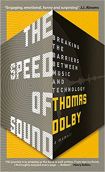The Speed of Sound by Thomas Dolby
| The Speed of Sound by Thomas Dolby | |
|
| |
| Category: Entertainment | |
| Reviewer: John Van der Kiste | |
| Summary: It's been an extraordinary career from pop star to hi-tech entrepreneur and university professor, rubbing shoulders with the famous on the way, but this perpetual self-reinventor is disarmingly self-effacing about it all. There have been mistakes, missed opportunities and setbacks along the bumpy road, but remarkable successes as well, and the result is a pleasure to read. | |
| Buy? Yes | Borrow? Yes |
| Pages: 288 | Date: June 2017 |
| Publisher: Icon Books | |
| External links: Author's website | |
| ISBN: 978-1785781957 | |
|
| |
From struggling post-punk musician to pop star, from Silicon Valley innovator to university professor, Thomas Dolby has had a remarkable if not unique career, often reinventing himself on the way. This memoir is based on his extensive notes and journals.
In the late 1970s the former Tom Robertson, a change of name to avoid confusion with his friend and contemporary, Tom '2-4-6-8 Motorway' Robinson, was just another teenager reading the music weeklies, listening to records, and working for a London greengrocer (until he was fired). His first lucky break came when he found an old discarded metal box with knobs on in the street. After taking it home, he found it was a synth module which just needed a soldering iron and a little know-how to restore it to health. Three or four years later he was a self-taught keyboard player working with the likes of Lene Lovich and Foreigner, and enjoying the odd hit single himself, notably 'Hyperactive'. He also played on an album by Def Leppard, nearly wrote a song for Michael Jackson (who however showed more interest in asking him to try and obtain some wild ragwort from Wales for his llamas), obtained the services of a reluctant Dr Magnus Pyke to make a cameo appearance on one of his singles and in the accompanying music video, and was taken to court by Ray Dolby of Noise Reduction Systems fame, whose legal action to make him change his name ultimately failed.
After the disappointing sales of a fourth album in 1991, he realised that everything had changed. The epicentre of the music business had passed from major record companies to CompuServe and AOL, eighties giants like Bruce Springsteen and George Michael were no longer huge stars, and with the advent of the digital age it was time to seek a new career. Multimedia CD-ROM products and ringtones were the new rock'n'roll, the shape of the future. The ups and downs of new technology, creating the synthesizer installed on most of our mobile phones, and writing soundtracks for computer games all beckoned, and along came the joys and otherwise of hiring workers and firing one over-ambitious colleague with a mind of his own.
Towards the end he admits that he spent the first thirty years of his career on a constant quest to explore new worlds. Realising at length that 'it wasn't making me happy', and that his restlessness drove him towards the next big thing several times, he gradually came to accept that he was not a businessman or a politician, but had 'the soul of an artist and a tinkerer'. I for one was pleased to read that he did return to making music on his own terms, releasing another album (part of a project also embracing an online game and a documentary film) on his own label. As if that was not enough, he also accepted a professorial appointment at a top American university.
For a man who has achieved so much, Thomas sounds endearingly self-effacing about it all. He has rubbed shoulders with the famous, and yet remains modest, disarmingly down to earth as he looks back on his life and times. There have been mistakes, missed opportunities and setbacks along the bumpy road, but he has evidently taken them all in his stride. On a personal note I enjoyed the earlier chapters, as he recalled his life in the music business, rather more than the CEO and boardroom sagas which came later. Having said that, everything had its place, and I found it all a pleasure to read.
For another contemporary memoir of the age, albeit written from a different slant, Teenage Revolution: Growing Up in the 80s by Alan Davies is worth reading, as is The Eighties: One Day, One Decade by Dylan Jones, focused largely on the acts who, like Dolby, played at Live Aid. The digital world's takeover of music is also explored in How Music Got Free: The Inventor, the Music Man, and the Thief by Stephen Witt.
Please share on: ![]() Facebook,
Facebook, ![]() Twitter and
Twitter and
![]() Instagram
Instagram
![]() You can read more book reviews or buy The Speed of Sound by Thomas Dolby at Amazon.co.uk Amazon currently charges £2.99 for standard delivery for orders under £20, over which delivery is free.
You can read more book reviews or buy The Speed of Sound by Thomas Dolby at Amazon.co.uk Amazon currently charges £2.99 for standard delivery for orders under £20, over which delivery is free.
![]() You can read more book reviews or buy The Speed of Sound by Thomas Dolby at Amazon.com.
You can read more book reviews or buy The Speed of Sound by Thomas Dolby at Amazon.com.
Comments
Like to comment on this review?
Just send us an email and we'll put the best up on the site.


